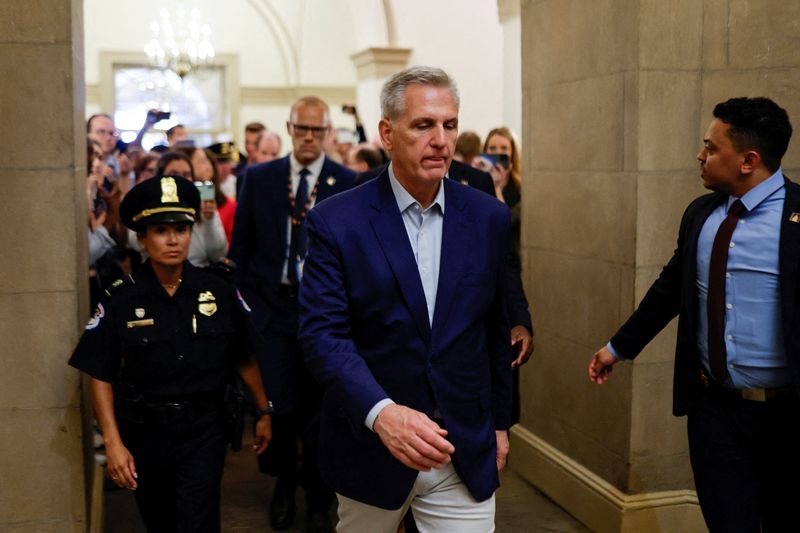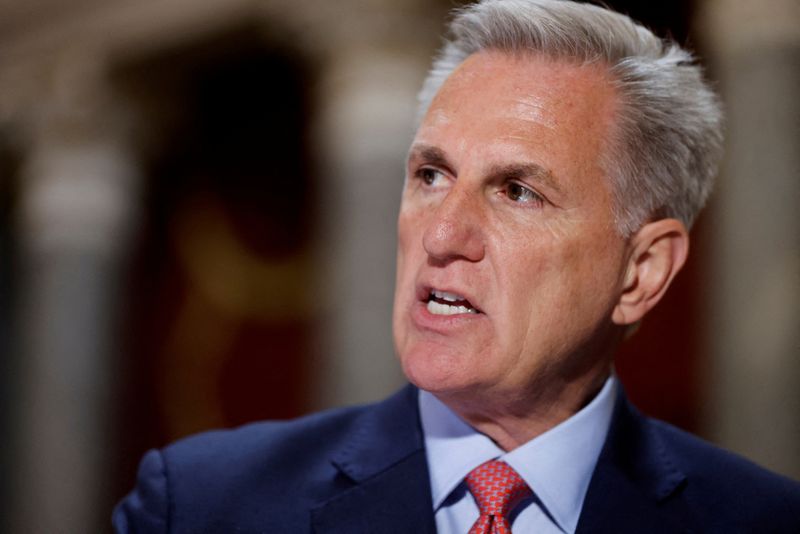By Gram Slattery and Andy Sullivan
WASHINGTON (Reuters) -A handful of hard-right Republican lawmakers said on Monday they would oppose a deal to raise the United States' $31.4 trillion debt ceiling, in a sign that the bipartisan agreement could face a rocky path through Congress before the U.S. runs out of money next week.
Although expected, the opposition illustrates the hurdles that Democratic President Joe Biden and top congressional Republican Kevin McCarthy will have to overcome to see the Republican-controlled House of Representatives and Democratic-controlled Senate pass the package.
Florida Governor Ron DeSantis, a candidate for the Republican 2024 presidential nomination, said the deal does not do enough to change the fiscal trajectory. "After this deal, our country will still be careening toward bankruptcy," he said on Fox News.
Still, backers predicted it would clear Congress before the United States runs out of money to pay its bills, which the Treasury Department says will happen on June 5.
"This thing will absolutely pass. There's no question about that," said Republican Representative Dusty Johnson, who said he had talked to dozens of fellow lawmakers.
Biden said he had been working the phones, as well. "It feels good. We'll see when the vote starts," he told reporters.
The 99-page bill would suspend the debt limit through Jan. 1, 2025, allowing lawmakers to set aside the politically risky issue until after the November 2024 presidential election. It would also cap some government spending over the next two years.
A crucial first test will come on Tuesday, when the House Rules Committee takes up the bill, in a necessary first step before a vote in the full House. Though the panel is normally closely aligned with House leadership, McCarthy was forced to include some skeptical conservatives as a price for winning the speaker's gavel.
One of those conservatives, Representative Chip Roy, said on Tuesday he did not support the bill.
"It's not a good deal. Some $4 trillion in debt for - at best - a two-year spending freeze and no serious substantive policy reforms," Roy wrote on Twitter.
Another panel member, Ralph Norman, has already come out against the agreement.
McCarthy told reporters on Monday he was not worried about the package's prospects in the committee.
In the Senate, Republican Mike Lee also came out against the bill, which could point to a difficult vote there, where any member has the power to delay action for days. Democrats control the Senate by 51-49.
McCarthy has predicted it will draw the support of most of his fellow Republicans, who control the House 222-213. House Democratic Leader Hakeem Jeffries said he expects support from his side of the aisle -- though many on his party's left may vote "no" as well.
Representative Raul Grijalva, a progressive Democrat, wrote on Twitter that the bill's changes to environmental rules were "disturbing and profoundly disappointing."
Grijalva was referring to an element of the bill that would speed up the permitting process for some energy projects. The bill would also claw back unused COVID-19 funds, and stiffen work requirements for food aid programs for poor Americans.
It would shift some funding away from the tax-collecting Internal Revenue Service, though White House officials say that should not undercut enforcement in the near term.
Initial reaction has been positive from financial markets, which would be thrown into chaos if the United States was unable to make payments on its securities, which form the bedrock of the global financial system.
But some investors are wary that the spending cuts secured by McCarthy could weigh on U.S. growth. Investors are also bracing for potential volatility in the U.S. bond market.
Republicans have argued that steep spending cuts are necessary to curb the growth of the national debt, which at $31.4 trillion is roughly equal to the annual output of the economy.

Interest payments on that debt are projected to eat up a growing share of the budget in the decades to come as an aging population pushes up health and retirement costs, according to government forecasts.
The deal would not do anything to rein in those fast-growing programs. Most of the savings would come by capping spending on domestic programs like housing, border control, scientific research and other forms of "discretionary" spending. Military spending would be allowed to increase over the next two years.
